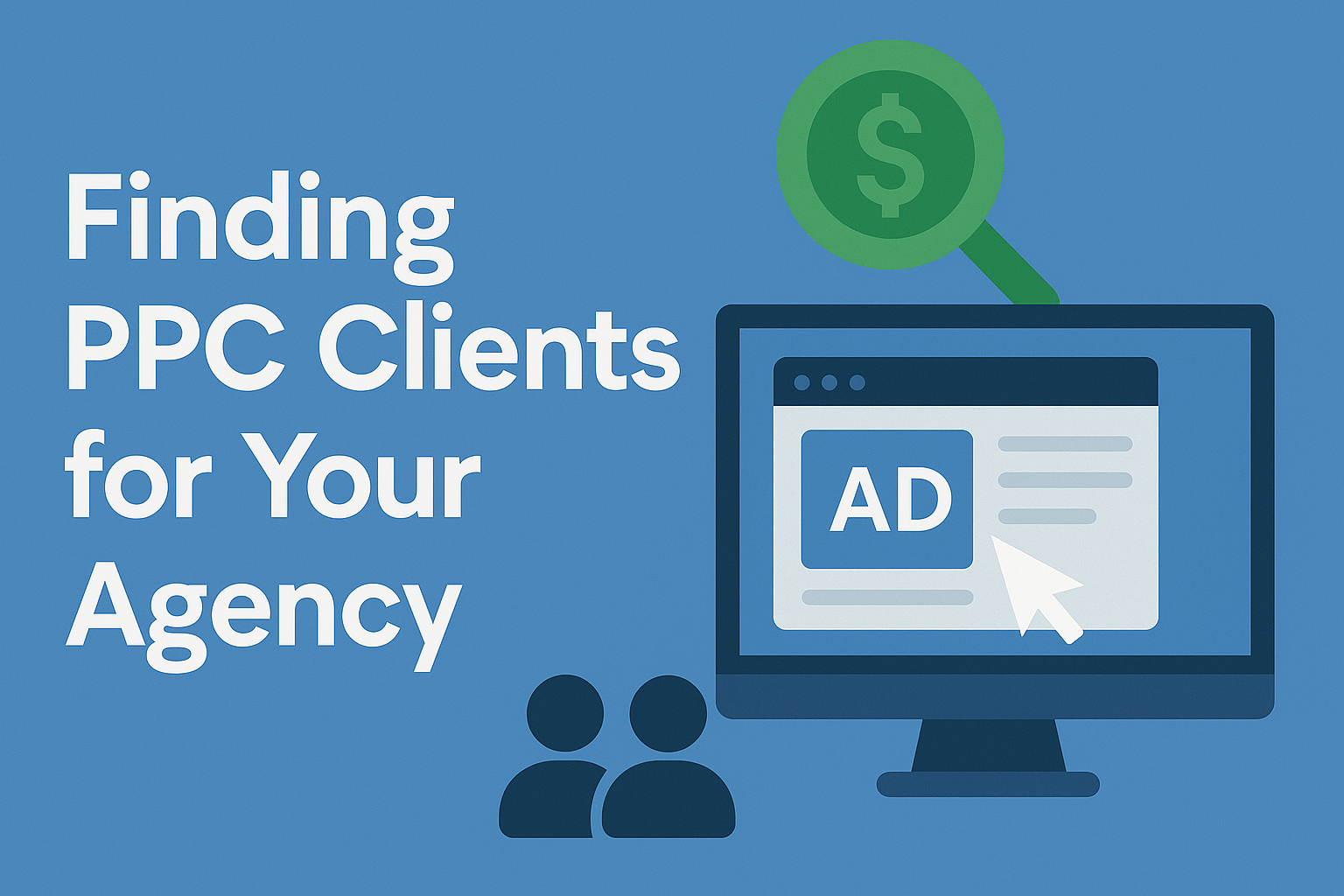PPC advertising remains one of the fastest and most measurable ways for businesses to drive leads and sales. As demand grows, agencies offering PPC services have an enormous opportunity—but finding consistent, high-quality clients is often the hardest part.
Most agencies don’t struggle with delivering results—they struggle with building a pipeline. Whether you’re just starting out or looking to scale, relying solely on word-of-mouth isn’t enough. You need a system.
This guide walks through proven methods to find PPC clients using cold outreach, social media, online platforms, and partnerships—so your agency can generate steady leads and grow predictably.
Define Your Ideal PPC Client
Before reaching out or launching any campaigns, your agency needs to define exactly who you’re trying to attract. Casting a wide net wastes time, leads to mismatched expectations, and lowers your close rate.
Start by narrowing down on three key areas:
1. Industry or Niche
Focus on verticals that benefit most from PPC—like home services, e-commerce, SaaS, or local B2C services. Specializing in one or two industries helps you speak their language and build relevant proof.
2. Budget Range
Not all businesses are ready for PPC. Define your minimum ad spend and service fee requirements. For example, targeting businesses that can invest at least $2,000/month (ads + management) ensures campaigns have room to perform.
3. Business Type and Readiness
Go after businesses with an existing marketing budget and some digital presence—those with websites, basic tracking, or CRM systems in place. These clients are easier to onboard and more likely to retain long-term.
Knowing exactly who your ideal client is will guide your messaging, targeting, and channel selection in every outreach effort that follows.
Use Cold Email Outreach Strategically
Cold email, when done right, remains one of the most effective and scalable ways to find PPC clients. The key is targeting the right businesses with personalized, relevant messaging.
1. Build a Quality Prospect List
Use tools like Apollo, LinkedIn Sales Navigator, or manual Google searches to find businesses in your target niche. Focus on those running poor or no ads, with decent websites and clear service offerings.
Include key details in your list like:
- Contact name
- Business type
- Website
- Observations (e.g., “no Google Ads running”)
2. Craft a Concise, Value-Driven Pitch
Keep your cold emails short (under 120 words). Make it personal, skip the fluff, and get to the point:
- Identify a pain point or missed opportunity (“I noticed you’re not running search ads for [keyword]…”)
- Offer a quick win (“We specialize in helping [industry] generate leads using PPC—usually within 30 days.”)
- Include a low-bar CTA (“Open to a quick 10-min call this week?”)
3. Follow Up Without Being Pushy
Most deals come after 2–4 follow-ups. Space them out, reference the first email, and test different angles (value add, question, offer to help). Use tools like Mailshake, Instantly, or Lemlist to automate and track outreach.
Cold email works best when it’s highly targeted, consistently executed, and paired with a clear offer that solves a real problem.
Leverage Social Media for Lead Generation
Social media isn’t just for content—it’s a powerful channel for attracting PPC clients, especially for agencies that want to build authority and reach decision-makers directly.
1. LinkedIn for Direct Outreach and Positioning
LinkedIn is ideal for B2B client acquisition.
- Optimize your profile to clearly state what you do (e.g., “We help service businesses get leads through PPC in under 30 days”).
- Connect with your target audience—business owners, marketing managers, or decision-makers in your niche.
- Send value-first messages like short audits or insights based on their website or ad presence.
- Post content showing results, tips, or industry insights—this builds trust over time.
2. Facebook Groups and Communities
Join niche business groups where your potential clients hang out.
- Participate in conversations and offer advice without selling.
- Watch for posts where people are asking for PPC help or recommendations.
- Position yourself as helpful, not salesy—then take the conversation to DMs.
3. Instagram and TikTok for Awareness
If you’re targeting small business owners, short-form videos showing PPC wins, audits, or tips can drive inbound DMs. Focus on simple, direct content—like “Why your Google Ads aren’t working” or “$5k ad spend to $18k revenue—here’s how.” Check Google ads PPC Management Services
4. Paid Social for Lead Capture
Run retargeting or lead magnet ads to drive traffic to a PPC audit form or free strategy session. This works best if you already have website traffic or a warm audience from organic efforts.
Social media gives your agency visibility, trust signals, and a direct line to ideal clients when used consistently and with intent.
Optimize Your Agency Website for Inbound PPC Leads
Your website is often the first impression prospects get—and if it’s not optimized to convert, you’re leaving leads on the table. Even if your outreach is strong, prospects will check your site before responding.
1. Clear Positioning and Offer
Make it obvious what you do. Your headline should speak directly to your niche and service (e.g., “PPC Lead Generation for Home Service Businesses”). Avoid vague language like “digital solutions.”
2. Service Pages That Convert
Have a dedicated page for PPC services with details on:
- What platforms you work with (Google Ads, Meta, Bing)
- What’s included (strategy, setup, management, tracking)
- Expected outcomes
- Pricing (if appropriate) or offer (e.g., free strategy call)
3. Social Proof and Trust Builders
Show client results, testimonials, logos, or video snippets. Even short quotes build credibility. If you’re new, consider offering a free pilot in exchange for a testimonial.
4. Strong CTAs and Lead Capture
Use clear CTAs throughout your site like “Book a Free PPC Audit” or “Request a Call.”
Use lead forms that are short and frictionless. Optionally, add a calendar link to schedule directly.
5. Lead Magnets for Passive Capture
Offer a free PDF guide, checklist, or quick PPC audit in exchange for an email. This lets you build a warm list for nurturing over time through email.
An optimized website positions your agency as credible and capable—making it easier to convert both cold and warm leads.
Use Freelance and Lead Gen Platforms
While often overlooked by agencies, freelance and lead generation platforms can be reliable channels for finding PPC clients—especially when used strategically and consistently.
1. Upwork
Upwork is competitive, but still viable for agencies with a sharp profile and relevant experience.
- Focus on high-value jobs (monthly retainers, not one-off audits).
- Create a compelling agency profile with niche specialization, relevant portfolio work, and clear service packages.
- Apply fast with personalized proposals that address the client’s pain points and offer a specific outcome.
2. Bark and Thumbtack
These platforms let you respond directly to businesses actively looking for PPC help.
- Buy credits to pitch to leads based on location and service type.
- Focus on speed and clarity—brief intro, what you offer, and a call to action.
- Track ROI carefully, as not every lead will be qualified.
3. Clutch and DesignRush
These directories are ideal for agencies with a few clients and reviews.
- Create a complete profile with service categories, pricing range, and testimonials.
- Use as a credibility booster and backlink source.
- Leads may come indirectly through organic discovery.
4. Credo and GrowthMentor
These platforms pre-vet leads and match them with specialists.
- Apply as a vetted PPC provider.
- Expect more qualified leads but higher competition.
5. Fiverr Pro or Toptal (Optional)
If you’re targeting smaller budgets or want to test productized PPC offers, these platforms can provide quick wins, especially for setup or audits.
These platforms shouldn’t replace outbound, but they can supplement your client acquisition and give you warm leads already searching for PPC help.
Build Strategic Referral and Partner Networks
Referral networks can become a consistent, high-quality lead source—especially when built around complementary service providers who don’t offer PPC themselves.
1. Partner with Web Designers and Developers
Many business owners start by building or redesigning a website. These providers often get asked about traffic generation or marketing.
- Reach out to local freelancers or agencies.
- Offer a referral agreement or simply suggest a mutual exchange of leads.
- Make it easy for them to refer you—provide a one-pager or summary of your offer and process.
2. Collaborate with SEO Agencies or Consultants
SEO and PPC often go hand-in-hand. When an SEO client needs fast results, PPC is the natural complement.
- Build relationships with SEOs who don’t manage paid ads.
- Offer white-label services or direct referrals.
- Refer back for organic work when appropriate—make it a two-way channel.
3. Work with Marketing Coaches or Consultants
Business consultants and fractional CMOs often advise clients on ad spend decisions.
- Introduce your PPC process as a reliable solution they can recommend.
- Keep them updated on results so they trust your delivery.
4. Join Industry Networks and Local Business Groups
Being part of niche communities (chambers of commerce, trade groups, BNI, or industry Slack groups) increases word-of-mouth and inbound interest.
Referrals close faster, come with higher trust, and often lead to longer-term engagements. Treat your partners like clients—communicate regularly and deliver results that reflect well on them too.
Conclusion
Finding PPC clients for your agency doesn’t happen by chance—it requires a focused, multi-channel approach. From cold emails and social outreach to partnerships and lead platforms, each strategy plays a role in building a consistent pipeline.
Start by defining exactly who your ideal clients are. Then, use outbound tactics like cold email and social media to reach them directly, while optimizing your inbound assets—your website, referral network, and profile on lead gen platforms.
Consistency matters more than complexity. Agencies that show up, follow up, and clearly communicate their value will win more PPC clients—and keep them.

